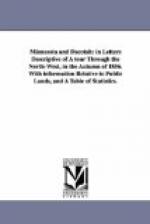Why should it be assumed that individual action in this respect is prohibited for towns any more than for trade or agriculture? It does not concern the Government whether two persons preempt one hundred and sixty acres each for the purposes of agriculture, or for the purpose of a town, except that the latter object will, incidentally, be more beneficial to the Government. Nor is there any other consideration of public policy to induce the Government to endeavor to discourage the formation of towns. Why, then, object to individuals taking up a given quantity of land in one case rather than in the other?
Finally, the act of 1844 definitively construes the act of 1841, and proves that the “selection” for town sites there spoken of may be either by public authority or by individuals:— that the word is for that reason designedly general, and without qualification, but must be fixed by occupation. That act supposes public land to be “settled upon and occupied as a town site,” and “therefore” not subject to entry under the existing preemption laws. This description identifies it with the land “selected for the site of a city or town,” in the previous act. It limits the quantity so to be selected, that is, settled or occupied, to three hundred and twenty acres, and otherwise regulates the selection as hereinafter explained. It then provides how such town site is to be entered and patented. If the town be incorporated, then the entry is to be made by its corporate authorities. If the town be not incorporated, then it may be entered in the name of the judges of the county court of the county, in which the projected town lies, “in trust for the several use and benefit of the several occupants thereof, according to their respective interests.” Here we have express recognition of voluntary selection and occupancy by individuals, and provision for means by which legal title in their behalf may be acquired and patented.
I am aware that by numerous statutes anterior to the act of 1841, provision is made for the authoritative selection of town sites in special cases; but such provisions do by no means exclude or contradict the later enactment of a general provision of law to comprehend all cases of selections for town sites, whether authoritative or voluntary. I think the act of 1841, construed in the light of the complementary act of 1844, as it must be, provides clearly for both contingencies or conditions of the subject. Among the anterior acts, however, is one of great importance and significancy upon this point, more especially as that act received exposition at the time from the proper departments of the Government. I allude to the act of June 22d, 1838, entitled “An act to grant preemption rights to settlers on the public lands.” This act, like that of 1841, contains a provision reserving certain lands from ordinary preemption, among which are:
“Any portions of public lands, surveyed or otherwise, which have been actually selected as sites for cities or towns, lotted into smaller quantities than eighty acres, and settled upon and occupied for the purposes of trade, and not of agricultural cultivation and improvement, or any land specially occupied or reserved for town lots, or other purposes, by authority of the United States.” (v Stat. at Large, p. 251.)




